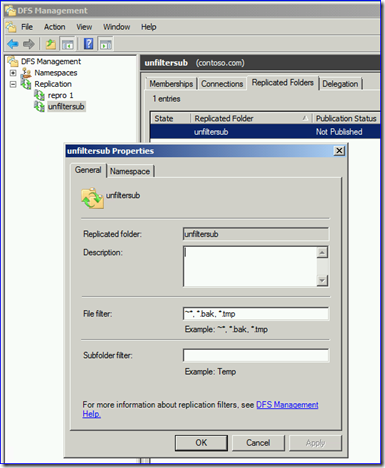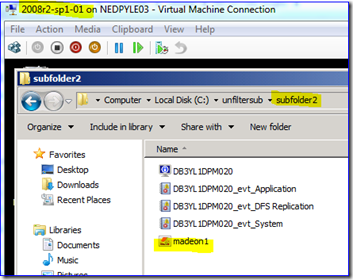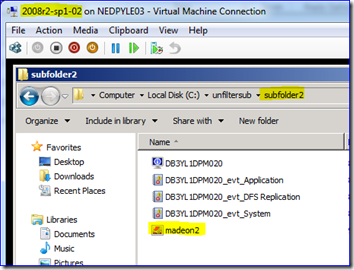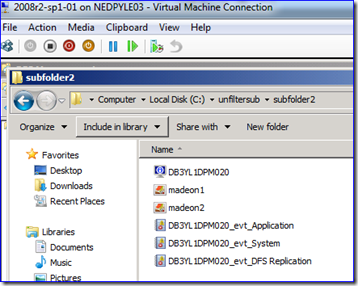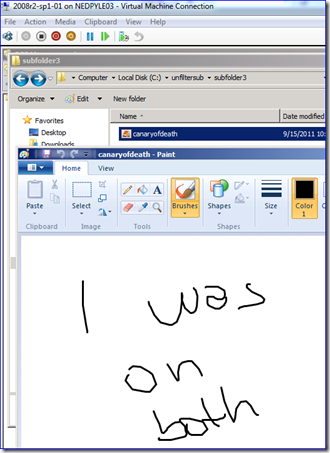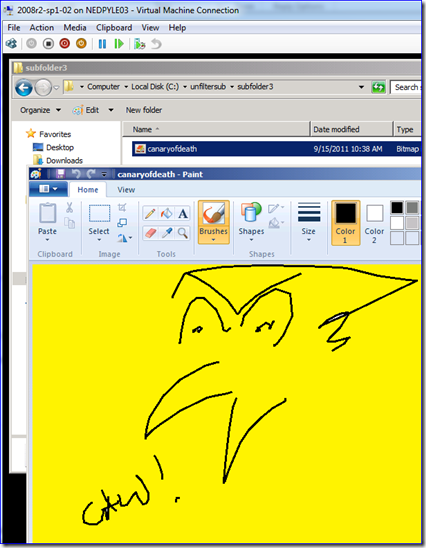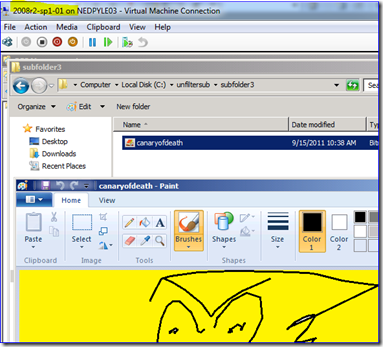Removing DFSR Filters
Hi folks, Ned here again. DFSR administrators usually know about its built-in filtering mechanism. You can configure each filter based on file name and extension; by default, files named like “*.bak, *.tmp, ~*” are filtered, as they are unlikely to be permanent or useful between servers. You can also filter out folders; this is less common, as you cannot provide a full path - only a name. Sometimes though, it is useful for a specific working folder used by applications.
When you enable a filter, each server scans its database for that replicated folder path and removes any records of files and folders that match the filter. Because the database doesn’t care about filtered objects, DFSR ignores any future changes to the files. In practical filtering terms, this means:
1. Any new files/folders added do not replicate to any other server.
2. Files/folders that already exist through previous replication stay on all servers.
3. Files/folders previously replicated and then later modified after enabling the filter are quasi-deleted from all other servers, in the sense that they are added to the database tombstone list. After all, they are filtered and therefore “no longer exist” when updated, according to the downstream servers. But the files do not actually get deleted from the replicated folder; they simply stop replicating and if anyone changes them on various server nodes, they diverge.
But what about when you remove filters?
This is rare enough that we've never bothered to document it. There are key issues to understand:
1. You must install the latest DFSR hotfixes for your operating system, on all DFSR servers.
List of currently available hotfixes for Distributed File System (DFS) technologies in Windows Server 2008 and in Windows Server 2008 R2 - https://support.microsoft.com/kb/968429
List of currently available hotfixes for Distributed File System (DFS) technologies in Windows Server 2003 and in Windows Server 2003 R2 - https://support.microsoft.com/kb/958802
Do not continue with any filter changes until installing those hotfixes and restarting the DFSR servers*. There is a very nasty bug that leads to folders refusing to replicate their previously filtered-contents or files that disappear from partner servers.
* Alternatively, you can stop the DFSR service and install the hotfixes. Generally, the removes the need to restart and no prompt displays.
Note:
I'm often asked if DFSR hotfixes are recommended preemptively and the answer is YES. Data loss hotfixes do not fix your lost data, only make further data loss stop! You should probably keep on top of NTFS hotfixes too.
2. Any changes made between servers after enabling the filter are going to result in some deleted or overwritten files, and that is by design. By setting a DFSR filter, you told DFSR that those folders and their contents no longer existed in DFSR terms. When the filter comes off and after making the first change in some server’s copy of that folder, the conflict resolution algorithm is going to kick in and the two folders synchronize, regardless of your wishes as to which folder will win.
Here I filtered subfolder2 and created – on each server – different bmp files named madeon1 (on server 01) and madeon2 (on server 02):
Then I removed the filter, forced AD replication, and forced DFSR to poll AD. Those files are different, so nothing “bad” happened and they sync:
However, if I repeat that un-filtering test with two files with the same name, but different contents (the file was originally replicated to both server, filtered out, and then later modified on server 02):
Then the newer file will win, overwriting what’s on 01 (even if it was “good” data for some user). This is why when you filter folders from replication, you should make sure it’s not user data that is still modified on multiple servers. Someday it may have to re-converge.
3. It is critical that you back up filtered folders on all servers replicating its parent, as you are very likely to need to restore some files in order to undo some of the conflict resolution damage. Some users are going to be very unhappy otherwise – and if they are the Vice President of TV Programming and Microwave Oven Technologies, they will come down on you like a load of bricks.
A minority of customers use DFSR folder filters – they are not very flexible, due to their lack of path support. They are safe only if users cannot alter them or their contents – then at least they will not have a negative experience.
Until next time,
- Ned “Director of Directories” Pyle
